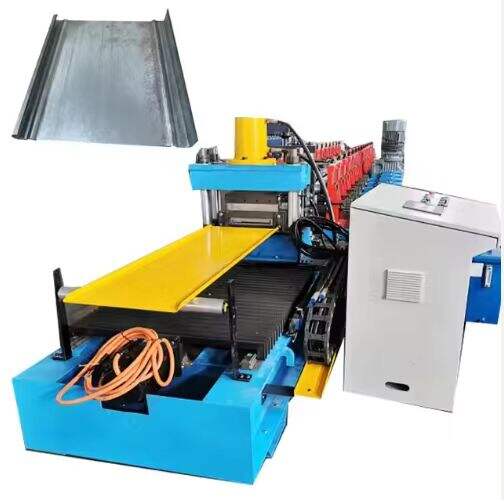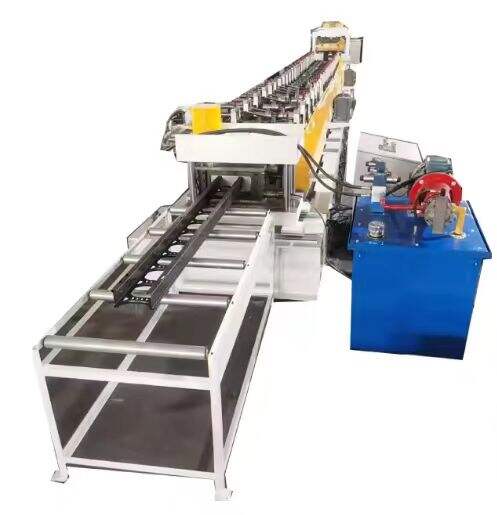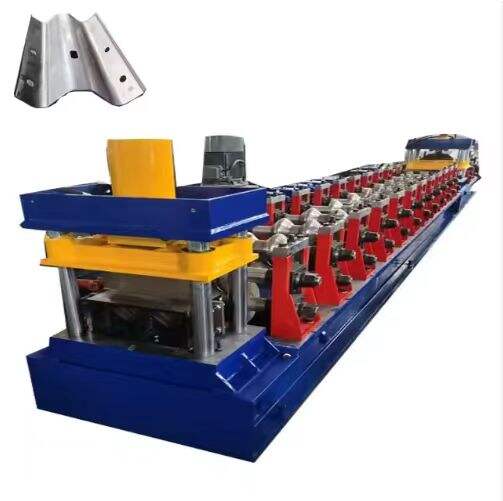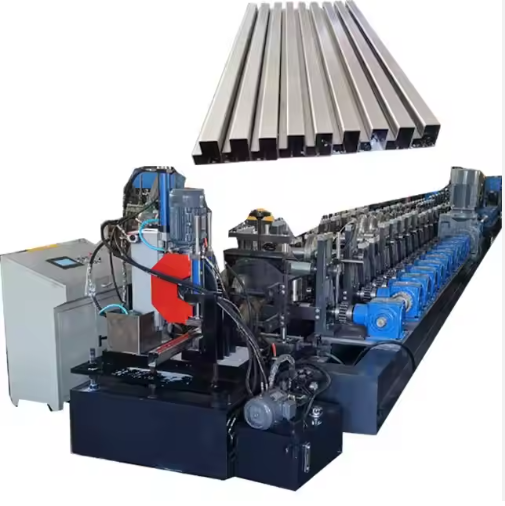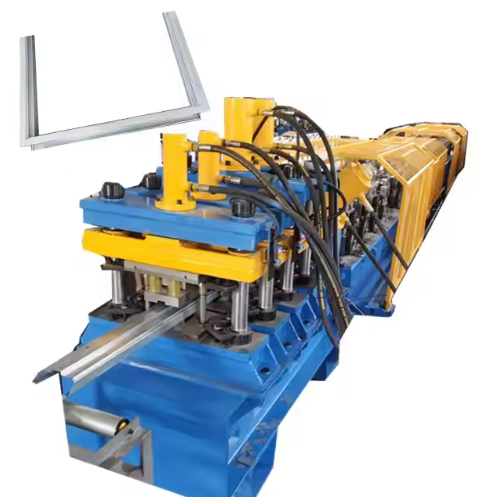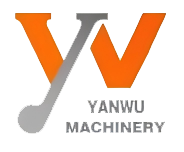Custom Roll Forming Solutions for Diverse Industrial Needs
Understanding Custom Roll Forming Solutions
The Science Behind Roll Forming Technology
Roll forming is a sophisticated metal forming process that continuously bends flat metal sheets into desired profiles. This transformation relies heavily on the principles of material mechanics and the unique properties of metals, such as steel, aluminum, and titanium. The precision inherent in roll forming technology allows it to produce intricate geometries with minimal waste, thereby enhancing operational efficiency. A key aspect of this process is the use of specifically designed rollers tailored to achieve precise profiles. This ensures that the end product meets stringent industrial requirements. Studies have demonstrated that companies utilizing roll forming technology can significantly reduce production times and costs, with some reports indicating potential savings of up to 30% compared to traditional methods. This makes roll forming an invaluable asset in industries focused on bulk production and cost efficiency.
Cold vs. Hot Roll Forming: Industrial Applications
Cold roll forming is best suited for lighter gauge metals and offers enhanced surface finishes and tighter tolerances, making it ideal for manufacturing delicate components, such as those used in electrical systems. Conversely, hot roll forming supports thicker materials, lending strength to structural components necessary for construction, like beams used in bridges. Both methods cater to distinct industrial applications; the automotive sector, for instance, frequently employs cold roll-formed products, while the construction industry benefits from hot roll-formed structural elements. As industries continue to evolve, there is a discernible trend towards adopting both roll forming techniques. Market analyses forecast a 5% annual increase in the adoption of cold roll forming across various sectors, highlighting its growing importance in manufacturing processes.
Key Benefits of Roll Forming Machines
Precision Engineering for Complex Profiles
Roll forming machines excel in precision engineering, enabling the creation of complex profiles tailored to specific design and engineering requirements. This is particularly crucial in industries such as aerospace and automotive, where maintaining tight tolerances is non-negotiable for ensuring product quality and safety. Advances in technology have equipped these machines with computer-controlled systems that enhance accuracy. These systems allow for real-time adjustments during production, ensuring that even the most intricate profiles are consistent and precise throughout the manufacturing process.
Cost-Efficiency in High-Volume Production
The roll forming process is inherently cost-efficient, especially in high-volume production scenarios. Automation within these systems significantly reduces the need for manual labor, leading to considerable labor savings. Studies indicate that when large quantities are produced, the per-unit cost in roll forming is notably lower than other metal forming techniques. This cost reduction is further amplified by the minimized material waste and streamlined production cycles that characterize roll forming operations. Thus, businesses can achieve greater profitability and competitiveness in their manufacturing endeavors.
Material Versatility in Metal Fabrication
Roll forming machines demonstrate exceptional material versatility, accommodating a wide range of metals, including aluminum, steel, and copper. This versatility allows manufacturers to explore various metal types, leading to innovative designs and applications across industries. The adaptability of roll forming makes it a preferred choice in diverse fields such as construction, automotive, and electronics. By utilizing different materials, manufacturers can customize their products to meet specific performance criteria, enhancing both functionality and market appeal.
Industrial Applications of Roll Formed Components
Cable Management Systems & Electrical Infrastructure
Roll formed components play a pivotal role in the manufacturing of cable management systems, greatly contributing to organized and efficient electrical installations. Studies indicate that utilizing roll formed materials enhances the performance and longevity of electrical infrastructure solutions. This improvement is leveraged by the high precision of roll forming machines, which ensures consistent quality. Additionally, the standardization offered by roll forming in cable management leads to increased efficiency and reduced installation time, streamlining project workflows and enhancing the ease of maintenance.
Structural Support for Construction & Transportation
In the construction sector, roll formed components are crucial for providing structural support, reinforcing frameworks to ensure safety and stability. These components are highly valued for their ability to meet stringent safety standards as emphasized by regulatory bodies. The transportation industry also benefits significantly from roll forming, using these components for vehicle frames and other structural parts. This enhances reliability and performance, which is essential in both industries where safety and durability are non-negotiable parameters.
Customized Solutions for Retail & Warehouse Systems
Roll forming technology is instrumental in creating customized shelving and display solutions tailored to meet the unique demands of retail and warehouse environments. Studies have shown that these custom solutions significantly improve organization, accessibility, and operational efficiency by allowing businesses to optimize storage and display space effectively. With the rapid growth of e-commerce, the demand for such tailored roll formed designs has seen a marked increase, helping retailers maximize space usage while enhancing the shopping experience for customers.
Featured Roll Forming Machinery Solutions
Iron Steel Cable Ladder Side Forming Machine
The Iron Steel Cable Ladder Side Forming Machine is designed to manufacture robust and versatile cable ladder systems for industrial applications. It supports various configurations to meet diverse project needs. The machinery's construction from iron steel ensures its durability, offering a long-lasting performance under a variety of environmental conditions.
Hot Sale 100-600mm Automatic Cable Tray System
The Hot Sale 100-600mm Automatic Cable Tray Forming Machine is engineered to enhance productivity through an automated manufacturing process. This equipment is widely used across various sectors due to its efficiency. Its adjustable width feature, ranging from 100mm to 600mm, enables customization according to specific project requirements.
Highway Guardrail Roll Forming Equipment
Specially crafted for producing highway guardrails, this roll forming equipment ensures that safety standards are met with its high resistance to impact. By leveraging advanced roll forming technology, it supports efficient mass production while maintaining high quality, crucial for highway safety equipment.
Supermarket Shelf Rack Production Line
Dedicated to manufacturing supermarket shelf racks, this production line aims to optimize the retail environment through thoughtful layout and design. With its emphasis on creating modular shelving systems, it allows for adaptable application in diverse retail formats, enhancing the shopping experience.
Door Frame Roll Former with Light Keel Integration
The Door Frame Roll Former integrates light keel technology, optimizing it for producing door frames that are both lightweight and sturdy. This design increases production efficiency by reducing labor costs, speeding up the project completion time, which is crucial for large-scale development projects.
Selecting the Right Roll Forming System
Capacity Requirements for Industrial Projects
Selecting the appropriate roll forming system starts with understanding a project's specific capacity requirements. Ensuring that the system can handle the necessary production volume, duration, and product specifications is crucial for efficiency and scalability in industrial projects. Companies must perform a thorough evaluation of their needs by considering factors like anticipated growth, variability in production demands, and potential future expansions. This ensures that they invest in a system that aligns with their operational objectives and avoids underutilization or over-extension of resources.
Integration with Secondary Manufacturing Processes
An effective roll forming system should seamlessly integrate with other manufacturing processes such as welding, painting, or assembly. This integration is essential for a cohesive production approach, enhancing productivity and streamlining the supply chain. By ensuring roll forming equipment can effectively interface with additional processes, businesses can reduce lead times and minimize manual interventions. This strategy not only improves overall operational efficiency but also supports high-quality output, catering to the complex demands of modern industry standards.

 EN
EN



















